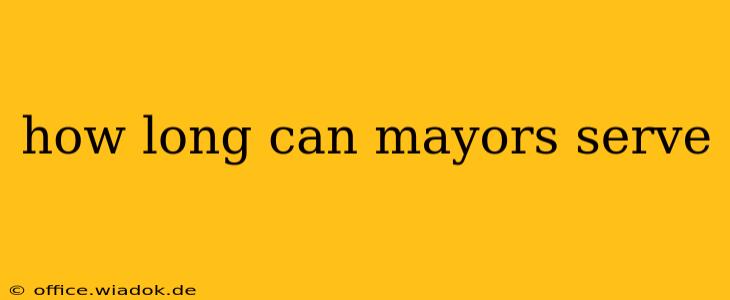The question of how long a mayor can serve is surprisingly complex, varying significantly depending on the specific municipality and its governing charter. There's no single, nationwide answer for the United States, or even within a single state. This guide will explore the diverse landscape of mayoral term limits, election processes, and the factors influencing a mayor's tenure.
Understanding Mayoral Term Limits
Mayoral term limits, the restrictions on the number of terms a mayor can serve, are established at the local level. This means:
- State Laws Play a Role: Some states have laws setting limits on mayoral terms for all municipalities within their borders. However, these state laws often provide flexibility for individual cities and towns to establish their own limits, or even to have no limits at all.
- City Charters Define Limits: A city's charter—its foundational document—is the primary source for determining term limits. These charters can specify the length of a single term (e.g., two years, four years) and the maximum number of consecutive or total terms a mayor may serve.
- No Universal Limit: Unlike some other elected offices, there's no federal or even broadly consistent state-level mandate on mayoral term limits. This results in a wide range of possibilities.
Common Term Limit Scenarios:
- Two-Year Terms: Many smaller municipalities have two-year mayoral terms, often with no limit on the number of terms.
- Four-Year Terms: Larger cities and metropolitan areas commonly have four-year terms, again with varying limits on consecutive or lifetime terms served.
- Term Limits (Consecutive or Lifetime): Many municipalities have imposed term limits, ranging from two consecutive terms to a total number of terms served throughout a mayor's career.
- No Term Limits: Some cities have no term limits at all, theoretically allowing a mayor to serve indefinitely as long as they win reelection.
Election Processes and their Influence
The election process itself significantly impacts how long a mayor serves:
- Direct Elections: Most mayors are directly elected by the citizens of their municipality. The outcome of these elections directly determines their continued tenure.
- Runoff Elections: If no candidate receives a majority of the votes in the initial election, a runoff election between the top two candidates is often held.
- Recall Elections: In some jurisdictions, citizens can initiate a recall election to remove a mayor from office before the end of their term if they gather sufficient signatures on a petition. This demonstrates that even with established term limits, a mayor's time in office isn't guaranteed.
Factors Affecting a Mayor's Length of Service
Beyond formal term limits and elections, other factors play a crucial role:
- Public Opinion and Performance: A mayor's popularity and performance significantly influence their reelection chances. Positive public perception and effective governance increase the likelihood of a longer tenure.
- Political Landscape: Changes in the political landscape, such as shifts in party affiliation or emerging competing candidates, can influence election outcomes and a mayor's ability to stay in office.
- Personal Decisions: A mayor might choose not to seek reelection due to personal reasons, even if they are eligible to serve additional terms.
Finding Specific Information
To determine the exact term limits for a specific mayor's office, you should consult the following resources:
- The City's Official Website: The city's website usually contains its charter or a summary of its governing documents.
- City Clerk's Office: The city clerk's office is an excellent source of information on local ordinances, including term limits and election procedures.
- State Election Website: The state's election website may provide information on mayoral elections and term limits within the state.
In conclusion, there's no simple answer to "how long can mayors serve?" The answer is always specific to the individual city or town and its governing rules. Thorough research into local ordinances and election procedures is vital for understanding the specifics of a particular municipality.

